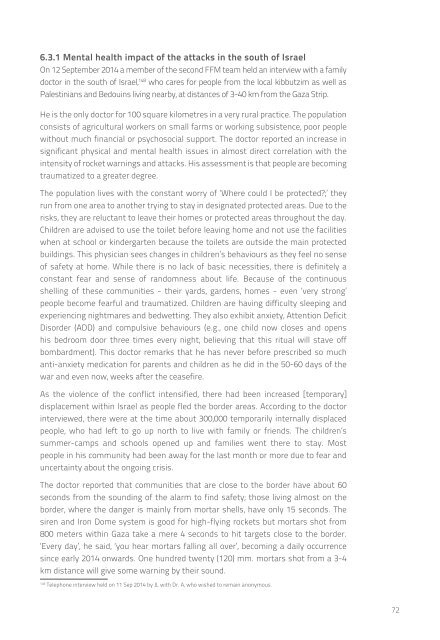HHo0s
HHo0s
HHo0s
You also want an ePaper? Increase the reach of your titles
YUMPU automatically turns print PDFs into web optimized ePapers that Google loves.
6.3.1 Mental health impact of the attacks in the south of IsraelOn 12 September 2014 a member of the second FFM team held an interview with a familydoctor in the south of Israel, 148 who cares for people from the local kibbutzim as well asPalestinians and Bedouins living nearby, at distances of 3-40 km from the Gaza Strip.He is the only doctor for 100 square kilometres in a very rural practice. The populationconsists of agricultural workers on small farms or working subsistence, poor peoplewithout much financial or psychosocial support. The doctor reported an increase insignificant physical and mental health issues in almost direct correlation with theintensity of rocket warnings and attacks. His assessment is that people are becomingtraumatized to a greater degree.The population lives with the constant worry of ‘Where could I be protected?;’ theyrun from one area to another trying to stay in designated protected areas. Due to therisks, they are reluctant to leave their homes or protected areas throughout the day.Children are advised to use the toilet before leaving home and not use the facilitieswhen at school or kindergarten because the toilets are outside the main protectedbuildings. This physician sees changes in children’s behaviours as they feel no senseof safety at home. While there is no lack of basic necessities, there is definitely aconstant fear and sense of randomness about life. Because of the continuousshelling of these communities - their yards, gardens, homes - even ‘very strong’people become fearful and traumatized. Children are having difficulty sleeping andexperiencing nightmares and bedwetting. They also exhibit anxiety, Attention DeficitDisorder (ADD) and compulsive behaviours (e.g., one child now closes and openshis bedroom door three times every night, believing that this ritual will stave offbombardment). This doctor remarks that he has never before prescribed so muchanti-anxiety medication for parents and children as he did in the 50-60 days of thewar and even now, weeks after the ceasefire.As the violence of the conflict intensified, there had been increased [temporary]displacement within Israel as people fled the border areas. According to the doctorinterviewed, there were at the time about 300,000 temporarily internally displacedpeople, who had left to go up north to live with family or friends. The children’ssummer-camps and schools opened up and families went there to stay. Mostpeople in his community had been away for the last month or more due to fear anduncertainty about the ongoing crisis.The doctor reported that communities that are close to the border have about 60seconds from the sounding of the alarm to find safety; those living almost on theborder, where the danger is mainly from mortar shells, have only 15 seconds. Thesiren and Iron Dome system is good for high-flying rockets but mortars shot from800 meters within Gaza take a mere 4 seconds to hit targets close to the border.‘Every day’, he said, ‘you hear mortars falling all over’, becoming a daily occurrencesince early 2014 onwards. One hundred twenty (120) mm. mortars shot from a 3-4km distance will give some warning by their sound.148Telephone interview held on 11 Sep 2014 by JL with Dr. A, who wished to remain anonymous.72


